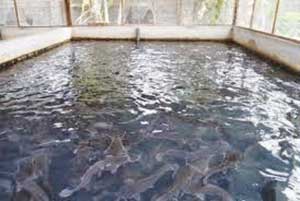Adenuga Adedeji runs a fish farm in Isele-Ijebu, near Ijebu-Ode on three plots of land with 14 concrete ponds of different sizes.
The farm has a total capacity of about 15 tonnes live weight catfish per cycle, a modern hatchery that can produce 100,000 fingerlings and a processing shed to package smoked catfish.
He is a graduate in animal production and health from the Federal University of Agriculture, Abeokuta, the founder and manager of Tepebo Farms in Ijebu Ode, Ogun State. He is undertaking postgraduate studies in animal nutrition and biochemistry at the University of Ibadan.
His interest in fishery was stoked by his background, with support from his parents and siblings.
Adedeji, 24, who employs two regular hands and some casuals during harvest and processing, is not looking for paid job, for fish farming gives him high returns on an investment that costs over N10 million.
He said with good management of fish farms, about 50 per cent profitability could be assured based on his experience.
Motivation
His motivation for agriculture came from his father who then was working with the Sunvit Agro Industrial Company, Agenebode, Edo State (Leventis Group), which had a crop duster airplane used for spraying and planting rice paddies.
“My interest grew whenever we travelled to the farm for vacation. So, while filling my Joint Admission and Matriculation Board (JAMB) form in SSS3 (Senior Secondary School 3), I chose veterinary medicine and animal production and Health.”
Support from relations, friends
For friends and relations, starting a farm was one of mixed feelings, but his parents backed him all through. The interest has always been there, and so during breaks and strikes, his parents encouraged him to visit neighbouring farms to have practical experience in poultry, piggery, and aquaculture.
Immediately after his final examination in the university, he enrolled at Felimar Aquaculture Centre to do menial jobs without pay so he could learn the skills for fish farming.
“When I started the farm, the support and initial startup came from my parents and then as the farm expanded, I took a loan from a church cooperative.
“During farmer registration exercise and enlightenment in my locality, I attended and met the Permanent Secretary, Federal Ministry of Agriculture and Rural Development, Ibukun Odusote, and she was interested in what I am doing.
“From there, I got three smoking kilns as support from the ministry.”
Bigger plans
“My plan for the project is to convert my present site to full scale fingerlings production that will serve me and other farmers around with good quality fingerlings. The plan is to expand to about five hectares of land containing about 100 earthen ponds, cassava and plantain plantation.
“I want to diversify into rearing livestock. I currently have Kalahari goats from South Africa which I purchased from FUNAAB, and I intend to start a breeding project in upgrading Nigerian indigenous breeds.”
The story of a South African, Vincent Mapeta, made Adedeji to realise that policy and support from the government can improve the lives of farmers, increase food production, and create jobs.
He canvassed that this will make agriculture a profitable venture that will encourage the youth.
“If the transformation agenda of the government can also follow this principle, that is, by getting young people involved through training, making land available (Mapeta got access to about 40 hectares of land) and funds to young farmers’ expansion initiative, then our success story in Nigeria and Africa is assured.”
Importance of Mentoring
“Mentoring helps in the success of any business. I didn’t make many mistakes as a result of those who mentored me. It is important to share problems and ideas with colleagues or peers in the business.
“When I observe anything unusual on the farm, I just make a call.















